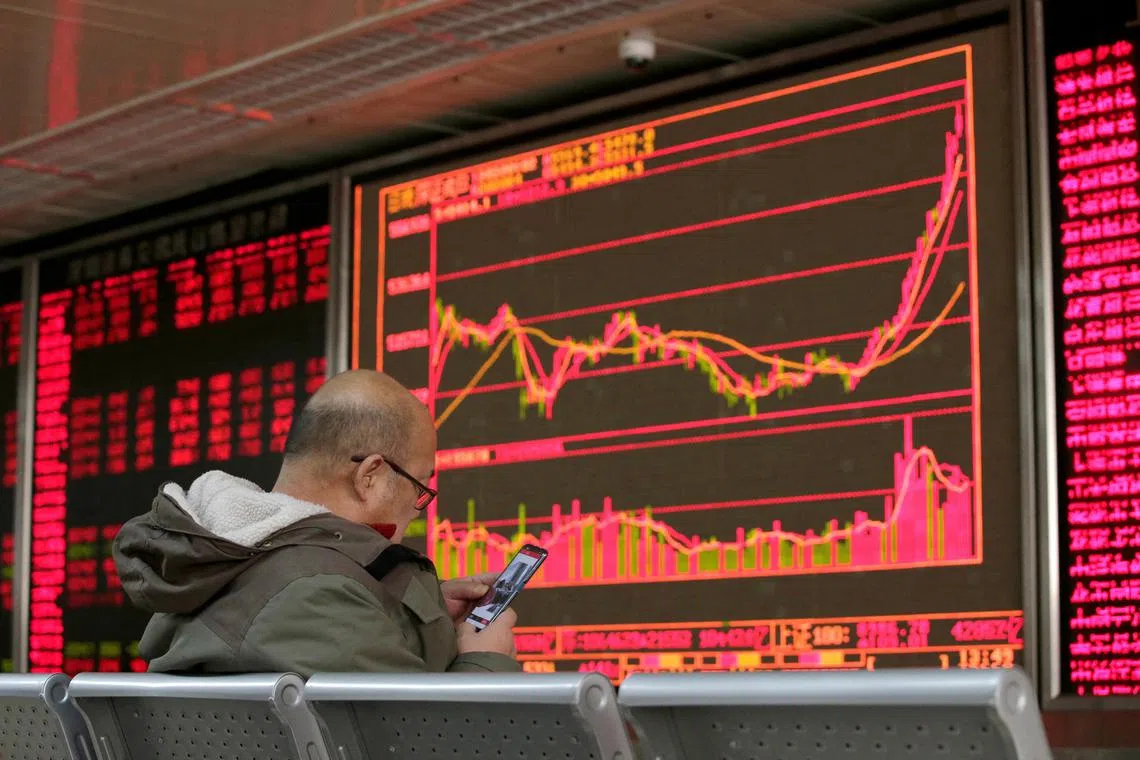Asian banks luring investors who think region is safer bet; S’pore seen as major beneficiary
Sign up now: Get ST's newsletters delivered to your inbox

China, with its easing monetary policy and a belated reopening from Covid-19, is the top attraction for investors.
PHOTO: REUTERS
Follow topic:
Sydney – The US-led banking turmoil
A Citibank analysis of global financial conditions shows Asian financial markets have tightened less than that in the United States and most Asian currencies have gained ground against the US dollar.
An index of financial stocks in the region, excluding Japan, has risen since March 10 – the day Silicon Valley Bank collapsed
“We think Asia still remains relatively well-insulated,” said Ms Johanna Chua, managing director and head of Asia-Pacific economic and market analysis at Citi.
“A US-centric slowdown means the US dollar will track lower, which is more supportive of capital flows in Asia.”
Economists say one factor working in favour of the Asia-Pacific region is a generally softer pivot in monetary policy, with central banks in Australia, South Korea, Indonesia and India among those pausing their tightening cycles.
China, with its easing monetary policy and a belated reopening from Covid-19,
This is reflected in the US$5.5 billion (S$7.3 billion) of funds that flowed into emerging market equity funds over the four weeks up to the end of March, led by Asia, according to TD Securities’ figures.
More than 70 per cent of that money went to China. At the same time, developed market equities suffered net outflows of US$8.6 billion, with the US hardest hit.
“Investors are still looking at EM (emerging market) Asia as perhaps the most-favoured region, followed by Europe and then perhaps by the US,” said Mr David Chao, global market strategist for Asia-Pacific at Invesco Asset Management.
“If you think that the Fed is going to hit a pause button on interest rate hikes, that would certainly drive capital flows back to EM Asia.”
An end to the cycle of hikes by the US Federal Reserve,
The Asian Development Bank has said that Asia’s developing economies, led by China, are on course for faster growth and slower inflation this year and next, while advanced economies are contributing to a darker global outlook.
China’s rebound is expected to percolate throughout the region, which also benefits from supply chain diversification, booming commodities and a lack of excessive debt growth, said Mr Frederic Neumann, chief Asia economist at HSBC Holdings in Hong Kong.
Ms Chua reckons that Hong Kong and Thailand, which benefit from China’s reopening, and domestic services-led economies like India and the Philippines “look relatively more resilient” to a global growth shock.
She said that “small, open economies” like Singapore, Vietnam, South Korea, Malaysia and Taiwan would likely be more vulnerable to those spillovers.
The banking turmoil may also mean that Asian tech money invested in the US could now begin to make its way back.
“Within Asia, I think Singapore will be the major beneficiary,” said Mr Prashant Newnaha, macro strategist at TD Securities. “Singapore has strong legal and banking frameworks and is looking to establish itself as the leader in tech and crypto within the region.”
Still, there are risks. Recent gloomy factory data from China dampened confidence about the speed of its rebound.
Also, China’s worsening relationship with the US increases the potential risks of investing in places such as Hong Kong and Taiwan, Mr Chao said.
Moreover, Asia is not totally immune to the financial instability that spread from the US.
“The outlook really depends on whether things stabilise in Europe and North America,” said Mr Jonathan Kearns, chief economist at Sydney-based investment management firm Challenger. “If there is some degree of ongoing turmoil, it will spill to Asia as well.” BLOOMBERG

